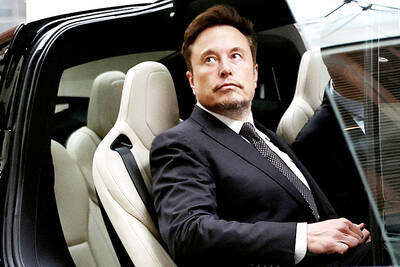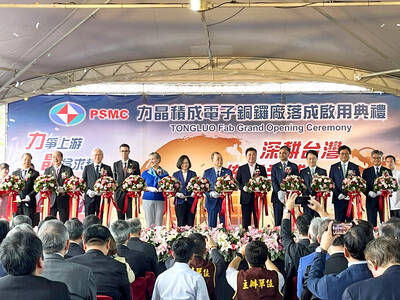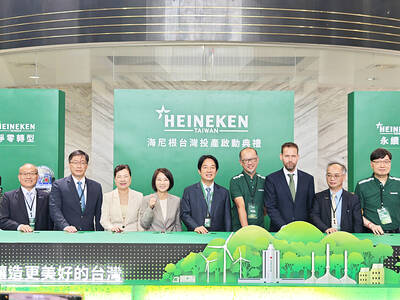Compal Electronics Inc (仁寶), which makes notebook computers for Lenovo Group (聯想), Hewlett-Packard Co and Dell Inc, is forecast to ship 42.8 million laptops this year, higher than the company’s original estimate of 42 million, CIMB Securities Ltd said yesterday.
The company, which also manufactures products for Apple Inc’s iPad, as well as smartphones for Lenovo and HTC Corp (宏達電), could ship 35.4 million smart devices this year, up 128.4 percent from last year, CIMB analysts Wang Wanli (王萬里) and Felix Pan (潘俊宏) said in a client note.
Overall, the company’s sales and earnings this year may top market expectations on the back of strong demand for commercial notebook computers and in the wake of its smooth integration of handset subsidiary Compal Communications Inc (華寶), the analysts said.
Net income may increase 150 percent to NT$6.17 billion (US$20.55 million) this year from NT$2.47 billion last year, with earnings per share of NT$1.4, while consolidated sales may rise 21.87 percent to NT$844.24 million from NT$692.75 million over the same period, CIMB forecast.
Compal, which has overtaken Quanta Computer Inc (廣達) as the world’s largest contract notebook computer maker, benefits when market demand for corporate laptops is stabilized, even though it is still premature to say the overall PC market is in full recovery as the consumer segment remained weak in the first half of the year, based on the latest industrial data compiled by both Gartner Inc and International Data Corp.
Also fueling the company’s growth momentum is an industry consolidation trend in the PC market, with Lenovo, HP and Dell gaining market share from rivals, helping push Compal’s sales for last month up 12.8 percent to NT$76.71 billion month-on-month and up 34.6 percent year-on-year. Last month’s sales were Compal’s highest in 44 months.
Last month, Compal shipped 4.4 million laptops, higher than rival Quanta’s 4.3 million units, to become the world’s largest contract notebook computer maker.
In the second quarter, Compal reported laptop shipments of 10.6 million units, up 17.8 percent quarter-on-quarter, compared with Quanta’s 11.5 million units, an increase of 9.5 percent from the previous three months.
“As long as corporate PC demand remains healthy in the second half of 2014, these three major PC vendors are likely to gain more market share globally,” Wang and Pan wrote in the note. “Other PC vendors either have limited exposure to the corporate segment or have already exited the market.”
Last week, market researcher Digitimes Research said Compal could beat Quanta in laptop shipments for the second half of the year on the back of increased orders from Lenovo, HP, Acer Inc (宏碁) and Toshiba Corp.
Compal shares gained 2.60 percent to end at NT$29.55 yesterday in Taipei trading following the report.
The stock has climbed 50 percent over the past 12 months, Taiwan Stock Exchange data showed.
CIMB upgraded its investment rating on Compal shares to “add” from “hold” and raised its target price on the stock to NT$34 from NT$28.8.

purpose: Tesla’s CEO sought to meet senior Chinese officials to discuss the rollout of its ‘full self-driving’ software in China and approval to transfer data they had collected Tesla Inc CEO Elon Musk arrived in Beijing yesterday on an unannounced visit, where he is expected to meet senior officials to discuss the rollout of "full self-driving" (FSD) software and permission to transfer data overseas, according to a person with knowledge of the matter. Chinese state media reported that he met Premier Li Qiang (李強) in Beijing, during which Li told Musk that Tesla's development in China could be regarded as a successful example of US-China economic and trade cooperation. Musk confirmed his meeting with the premier yesterday with a post on social media platform X. "Honored to meet with Premier Li

ARTIFICIAL INTELLIGENCE: The chipmaker last month raised its capital spending by 28 percent for this year to NT$32 billion from a previous estimate of NT$25 billion Contract chipmaker Powerchip Semiconductor Manufacturing Corp (力積電子) yesterday launched a new 12-inch fab, tapping into advanced chip-on-wafer-on-substrate (CoWoS) packaging technology to support rising demand for artificial intelligence (AI) devices. Powerchip is to offer interposers, one of three parts in CoWoS packaging technology, with shipments scheduled for the second half of this year, Powerchip chairman Frank Huang (黃崇仁) told reporters on the sidelines of a fab inauguration ceremony in the Tongluo Science Park (銅鑼科學園區) in Miaoli County yesterday. “We are working with customers to supply CoWoS-related business, utilizing part of this new fab’s capacity,” Huang said, adding that Powerchip intended to bridge

Dutch brewing company Heineken NV on Friday announced an investment of NT$13.5 billion (US$414.62 million) over the next five years in Taiwan. The first multinational brewing company to operate in Taiwan, Heineken made the statement at a ceremony held at its brewery in Pingtung County. It also outlined its efforts to make the brewery “net zero” by 2030. Heineken has been in the Taiwanese market for 20 years, Heineken Taiwan managing director Jeff Wu (吳建甫) said. With strong support from local consumers, the Dutch brewery decided to transition from sales to manufacturing in the country, Wu said. Heineken assumed majority ownership and management rights

Microsoft Corp yesterday said that it would create Thailand’s first data center region to boost cloud and artificial intelligence (AI) infrastructure, promising AI training to more than 100,000 people to develop tech. Bangkok is a key economic player in Southeast Asia, but it has lagged behind Indonesia and Singapore when it comes to the tech industry. Thailand has an “incredible opportunity to build a digital-first, AI-powered future,” Microsoft chairman and chief executive officer Satya Nadella said at an event in Bangkok. Data center regions are physical locations that store computing infrastructure, allowing secure and reliable access to cloud platforms. The global embrace of AI